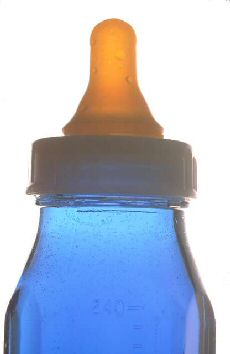 The chemical bisphenol A (BPA), which acts as an endocrine-disruptor that can trigger the early onset of puberty and decrease sperm production, has been found to leech from drinking bottles into the human body. The new study, by researchers at the Harvard School of Public Health (HSPH), showed that participants who drank for a week from polycarbonate bottles (the popular, hard-plastic drinking bottles) had a two-thirds increase in their urine of the chemical BPA.
The chemical bisphenol A (BPA), which acts as an endocrine-disruptor that can trigger the early onset of puberty and decrease sperm production, has been found to leech from drinking bottles into the human body. The new study, by researchers at the Harvard School of Public Health (HSPH), showed that participants who drank for a week from polycarbonate bottles (the popular, hard-plastic drinking bottles) had a two-thirds increase in their urine of the chemical BPA. Exposure to BPA, used in the manufacture of plastics, has been shown to interfere with reproductive development in animals. This study is the first to show that drinking from polycarbonate bottles increased the level of urinary BPA, and thus suggests that drinking containers made with BPA release the chemical into the liquid that people drink.
The study, appearing in Environmental Health Perspectives, notes that in addition to polycarbonate bottles, which are refillable and a popular container among students, campers and others and are also used as baby bottles, BPA is also found in dentistry composites and sealants and in the lining of aluminum food and beverage cans.
"We found that drinking cold liquids from polycarbonate bottles for just one week increased urinary BPA levels by more than two-thirds. If you heat those bottles, as is the case with baby bottles, we would expect the levels to be considerably higher. This would be of concern since infants may be particularly susceptible to BPA's endocrine-disrupting potential," said Karin B. Michels, the senior author of the study.
Canada has banned the use of BPA in polycarbonate baby bottles since 2008 and some polycarbonate bottle manufacturers have voluntarily eliminated BPA from their products. With increasing evidence of the potential harmful effects of BPA in humans, the authors believe further research is needed on the effect of BPA on infants and on reproductive disorders.
Related:
Scientists warn of health problems created by our "plastic world"
New Evidence Linking Pollutants To Penile Deformities
Call For Investigation Into Endocrine Disruptors
Phthalates - Expanding Our Waistlines And Shrinking Our Dicks?
Cause Of Early Puberty And Reproductive Problems Plastic?
Source: Harvard School of Public Health





